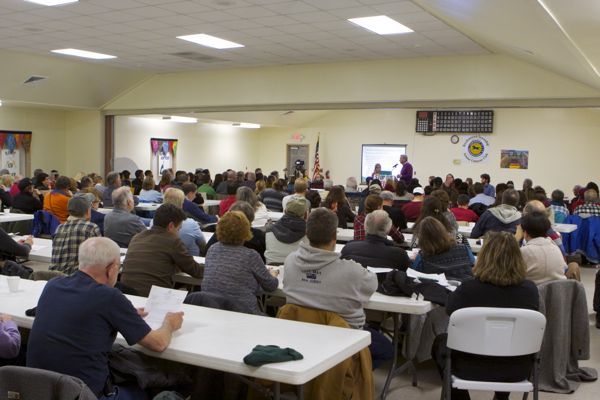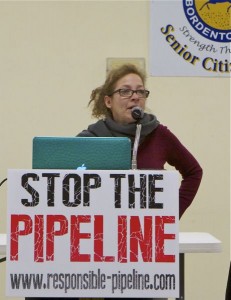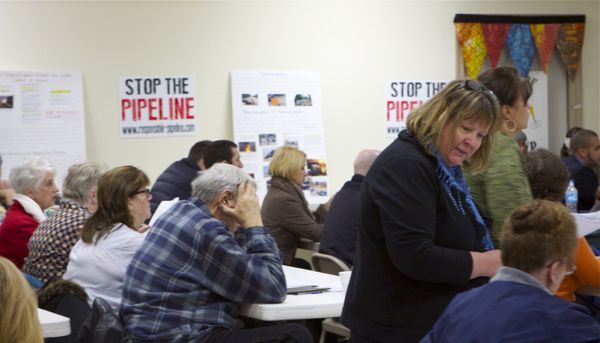Activists Fiddle With FERC & NEPA – Rome Burns
Over 200 opponents of the other Pinelands pipeline – proposed by NJ Natural Gas and dubbed “The Southern Reliability Link” – packed a standing room only crowd in Bordentown last night.
The Burlington County Times covered the event (read the whole story by David Levinsky, the lead correctly framed the issue), so I’ll be brief and expand on his lead:
BORDENTOWN TOWNSHIP — State and federal regulators may be just weeks away from rendering decisions on a controversial natural gas pipeline and related compressor station proposed for northern Burlington County but opponents urged area residents to keep up the fight.
“They want to rubber stamp and push this through as quickly as possible, but you as citizens have rights,” Jeff Tittel, director of the New Jersey Sierra Club, said Wednesday during an information forum at the township community center. “They don’t have a right to just build this pipeline. There are regulatory processes they have to go through and the louder the public speaks out the better.”
The event was organized by Food and Water Watch and the Mayor of Bordentown Township, and included speakers from Sierra Club and Pinelands Preservation Alliance.
The spot on critical remarks by Mayor Jill Popko in the set up story for the event were what likely attracted the turnout of local, state and federal elected officials – Lesson: this is how you hold politicians accountable: (NJ.Com story]
She [Popko] also put out a call to county freeholders, state senators, Assemblymembers, U.S. Sens. Cory Booker and Robert Melendez and U.S. Reps. Chris Smith and Tom MacArthur in the hopes that they would be able to talk to and hear their constituents’ concerns.
“If they’re not going to come out and take the time to hear what they have to say and hear their concerns, I think that speaks volumes,” Popko said of the legislators. “I know that our Congressional and Senate representatives hear plenty from their lobbyists, but maybe it’s time to hear from their constituents.”
The set up was perfect and the organizing was very well done and the turnout was fantastic.
But the challenge for the pipeline opponents is to channel the energy of all the local opponents and focus it on a specific demand from a political target with the legal/regulatory power to kill the pipeline.
Unfortunately, the opponents again failed to rise to that challenge and – to use a disgusting hunting metaphor – continue a shotgun (birdshot) approach that focuses on FEMA, NEPA, local governments, and private property rights – instead of the slug shot needed to kill this project.
I’ve been writing about these issues for months to try to influence the strategy and focus of pipeline opponents and activists, so let me try not to repeat that and make this as simple as possible.
The pipeline project is opposed for a myriad of good reasons that motivate residents, empower activists and support good public policy. But not all of them are equal in weight or equivalent in priority in terms of their ability to frame an effective message and support a campaign to kill the project.
Strategic judgments, focus, and discipline are required (just ask the Koch Brothers, whose strategy is exposed in this incredible paper).
The pipeline is regulated by a multitude of complex federal and state laws – again, not all are as enforceable and thus as effective in their ability to block the pipeline.
There essentially are four agencies that theoretically have regulatory power that could block the pipeline – but each agency has its own track record in review of pipelines, it’s own legal and policy framework and its own political accountability. Not all are equal in power and in the likelihood of saying NO – in a politically and legally defensible way – to a pipeline:
1) the Federal Energy Regulatory Commission (FERC)
2) the NJ Board of Public Utilities (BPU)
3) the NJ Pinelands Commission
4) the NJ Department of Environmental Protection (DEP)
So, let’s compress what I see are the key factors in selecting an agency target and legal/regulatory strategy that can support a winning message and mobilize activists:
a) strength of legal and regulatory framework;
b) agency policy priorities;
c) agency institutional history, culture, and track record on pipelines;
d) ability to hold the agency politically and legally accountable; and
e) ability to translate into action: spur public opposition and mobilize activism.
And now lets reach some strategic conclusions, based on these factors
Of course, if this were a rigorous analysis, I would explain and document each factor and assign weighted points and come up with a quantitative recommendation.
But, this is WolfeNotes (not a policy journal) and after 30 years of waging these kinds of battles and campaigns, let me just cut to the chase.
One thing is for sure – if I were to apply these factors to rank and select targets, a strategic focus on FERC and NEPA would come in dead last.
FERC operates under an incredibly pro-gas industry law written by the gas industry. The Courts have upheld that policy bias. Their professional staff training is biased towards extraction and FERC’s institutional values and culture are completely captured by the gas industry. FERC is ostensibly an independent regulatory agency that is relatively insulted from political intervention by Congress or the President and thus difficult to hold accountable. They are a complex, insular, and far away Washington DC beltway bureaucracy that is not open, transparent and activist friendly and frankly doesn’t give a rat’s ass about public opposition.
Not surprisingly, FERC has never said NO and rejected a proposed pipeline (at least that’s I’m aware of).
I would put NJ BPU in a similar category and low target priority ranking as FERC, but with slightly more favorable political accountability ratings because they operate under more favorable laws that could benefit the public interest, they implement a Energy Master Plan that could support sound policy decisions, and although supposed to be independent, they are essentially accountable to the Governor and an arm of his administration.
So, why on earth would pipeline opponents spend so much, time, energy, resources, and the enthusiasm of residents and activists on FERC? FERC is a total waste of time and resources.
Another thing is for sure – if I were to apply these factors to select a statute & regulatory framework, a target on National Environmental Policy Act (NEPA) would come in dead last also.
NEPA is what the lawyers call a “procedural statute” that is “not dispositive”. It is all about process and can not determine outcomes. NEPA is technocratic and complex and an EIS motivates only those absorbed by the technical and policy arguments and is hardly activist friendly. NEPA is administered by a far away low visibility DC Executive Branch bureaucracy that no one other than Al Gore types ever heard of (the Council on Environmental Quality (CEQ)) that is only weakly accountable to the Congress, the federal Courts and the President. In fact, Obama issued an Executive Order to “streamline” energy infrastructure NEPA reviews and Congress just enacted that EO into law (Obama signed the bill).
Historically, even NEPA victories -including those on project segmentation and failure to consider cumulative and secondary impacts – rarely have stopped a project and merely can inject delay and slow a project down. As I’ve noted, in the current economic climate of depressed energy prices and slack demand, delay actually benefits the gas industry.
So, why on earth would pipeline opponents spend so much, time, energy, resources, and the enthusiasm of laymen residents and activists on NEPA?
Arguments against a focus on private property rights and local Resolutions are even stronger than the arguments against a focus on FERC and NEPA, so I won’t spend any time on them here, but merely note that again we see pipeline activist emphasizing these ineffective arguments.
However, if I were to apply these factors, by far the number one target would be the Pinelands Commission.
The Pinelands Commission operates under an extremely strong federal and state legal framework. The pro-environmental policy priorities are expressed in an enforceable Comprehensive Management Plan (CMP). The staff are excellent professionals. The Commission has a history and culture that respects and protects the Pines. The Commissioners are local, accessible, operate in an open and transparent fashion, are are highly accountable. They are not captured by the gas industry. There is strong public, political, and media support for the protection of the Pinelands.
For all these reasons – and more – the Commission would have been an ideal and exclusive target.
But, under direction of Gov. Christie, Executive Director Wittenberg hijacked the Commission and unilaterally issued an approval of the pipeline known as a “Certificate of Filing”.
Pipeline opponents have been slow to adjust and move on from this reality – a lawsuit is the only thing that can respond to the Pinelands issues. They need to retarget. Or plan a direct action campaign of non-violent civil disobedience.
A distant second on the list would be the DEP.
But the DEP has plenty of legal and regulatory power to kill the pipeline. There is a DIRECT political accountability between DEP, environmental laws, and the Governor (that’s why successful activists in NY are targeting Gov. Cuomo so aggressively and effectively).
DEP’s history is not that good and the current leadership is in the process of dismantling the agency and destroying its culture. But the middle managers and professionals are for the most part reasonably balanced. There is strong public support for the environment that DEP manages – particularly clean water – and there is favorable media. There is plenty of good legal precedent and the Courts are willing to enforce it. The legislature is a problem, but, overall, DEP is moderately politically accountable, far more so that FERC, CEQ or BPU.
So why are pipeline activists not focused on Governor Christie and DEP’s regulatory powers – particularly under the Clean Water Act – and demanding that Christie direct DEP to kill the pipeline?
That failure is a continuing mystery and deep frustration.




Pingback: WolfeNotes.com » “People Over Pipelines”
Pingback: WolfeNotes.com » Stories and Photos From 2016 – Part 1 (of 4)